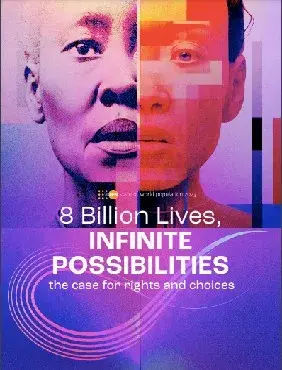FORWARD
In November 2022, the world population eclipsed 8 billion people. For many of us, it represented a milestone that the human family should celebrate — a sign that people are living longer, healthier lives and enjoying more rights and greater choices than ever before.
The relationship between reproductive autonomy and healthier lives is an uncontested truth: as women are empowered to make choices about their bodies and lives, they and their families thrive — and their societies thrive as well.
Yet that was not the message heard by much of the world. Instead, many headlines warned of a world teetering into overpopulation, or that whole countries and regions were ageing into obsolescence. Somehow, when the human numbers are tallied and population milestones passed, the rights and potential of individuals fade too easily into the background. Over and over, we see birth rates identified as a problem — and a solution — with little acknowledgement of the agency of the people doing the birthing.
This story was supposed to have changed. In 1994, the Programme of Action of the International Conference on Population and Development (ICPD) recognized that advancing gender equality and the empowerment of women and ensuring women’s ability to control their own fertility must be at the heart of population and development- related programmes.
This vision was articulated, in large part, because women’s movements saw both the violations that can occur when family planning is used as a tool for “population control” and what empowerment and autonomous family planning can help secure for individuals. Today, the 2030 Agenda for Sustainable Development expressly acknowledges that sexual and reproductive health and gender equality are essential for unlocking a more prosperous and sustainable future.
Why, then, are so many women still deprived of their bodily autonomy? The most recent data from 68 countries show that an estimated 44 per cent of partnered women are unable to make decisions over health care, sex or contraception. The result? Nearly half of all pregnancies are unintended, an abrogation of women’s basic human right to decide freely and responsibly the number and spacing of their children.
Today, climate change, pandemics, conflicts, mass displacement, economic uncertainty and other issues fuel concerns about over- and under-population. Yet human reproduction is neither the problem nor the solution.
This State of World Population report, produced by a group of external advisers, researchers and writers, working alongside UNFPA technical staff and editors, explores how broadening our understanding of population can lead to new solutions that build demographic resilience and help shape a more equitable and prosperous future.
Advancing gender equality is an often- overlooked solution to many of these concerns. In ageing, low-fertility countries with labour productivity concerns, achieving gender parity in the workforce is considered the most effective way to improve productivity and income growth. In high-fertility countries, empowerment through education and family planning is known to yield enormous dividends in the form of economic growth and human capital development.
That is why UNFPA is calling for expanded efforts to realize bodily autonomy and support sexual and reproductive health and rights for all — the foundation for full equality, dignity and opportunity. Every member of our human family has the right to make free and informed choices about their health, bodies and futures.
This right should be the starting point for all conversations about population. Population is, after all, about people, about creating the conditions for all 8 billion of us to live freely and fully, equal in dignity and rights, on a healthy, safe and prosperous planet. When we invest in people and their potential, in their rights and choices, all of humanity benefits.
Dr. Natalia Kanem
Executive Director
United Nations Population Fund


